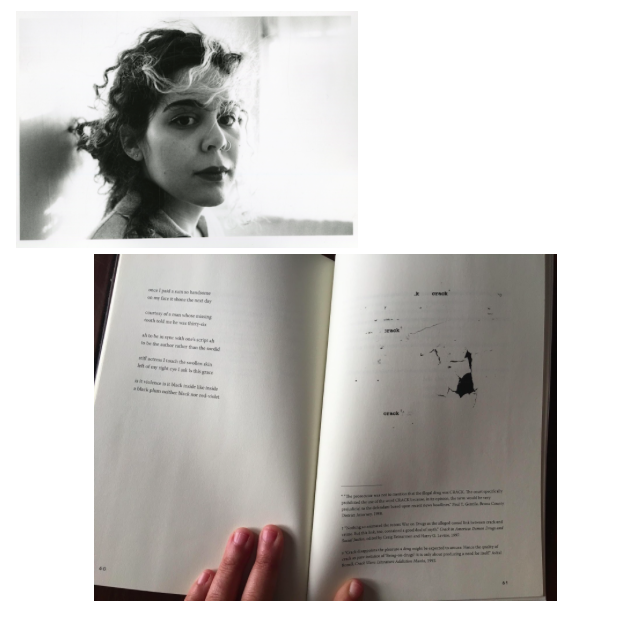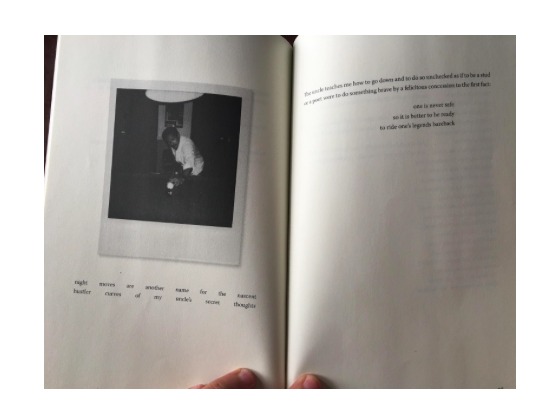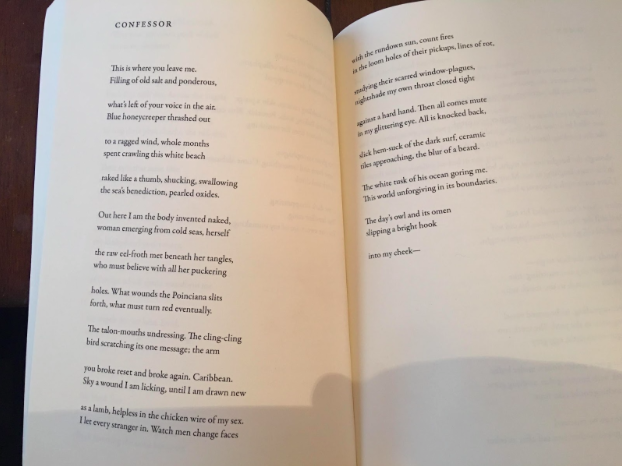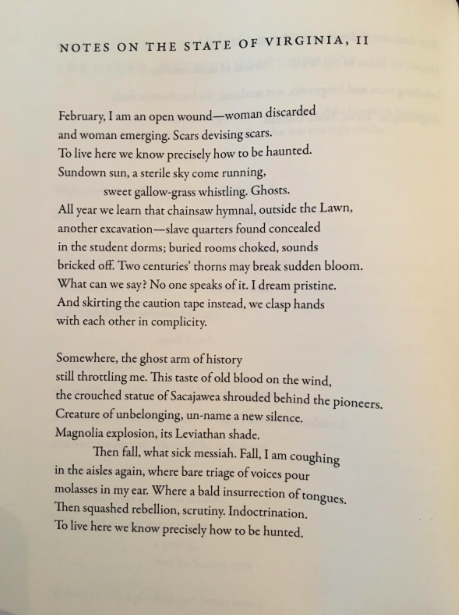6th ANNUAL NAPOMO 30/30/30 :: DAY 15 :: Vanessa Angélica Villarreal on Muriel Leung, Lara Mimosa Montes, and Safiya Sinclair
[box][blockquote]HAPPY POETRY MONTH, FRIENDS AND COMRADES!
For this, the 6th Annual iteration of our beloved Poetry Month 30/30/30 series/tradition, I asked four poets (and previous participants) to guest-curate a week of entries, highlighting folks from their communities and the poets who’ve influenced their work.
I’m happy to introduce Janice Sapigao, Johnny Damm, Phillip Ammonds, and Stephen Ross, who have done an amazing job gathering people for this years series! We’re so excited to share this new crop of tributes with you. Hear more from our four guest editors in the introduction to this year’s series.
Hungry for more? there’s 150 previous entries from past years here! You should also check out Janice’s piece on Nayyirah Waheed, Johnny’s piece on Raymond Roussel, Phillip’s piece on Essex Hemphill, and Stephen’s piece on Ronald Johnson’s Ark, while you’re at it.
This is a peer-to-peer system of collective inspiration! No matriculation required.
Enjoy, and share widely.
– Lynne DeSilva-Johnson, Managing Editor/Series Curator [/blockquote][/box]
[line][line]
[box]WEEK TWO :: CURATED BY JOHNNY DAMM
PROPOSITION:
Every time a WRITER sees another WRITER on the street, WRITER # 1 yells the following question:
“Who are you reading?”
WRITER # 2 answers, also yelling, and at the first word, EVERYONE on the street stops walking, presses hands over mouths of cooing/crying babies, slams down car brakes and hurriedly unrolls windows.
EVERYONE listens, the world not allowed to resume until WRITER # 2 stops yelling.
SMALL REVISION:
Keep everything exactly the same, except make sure that WRITER # 2 is a talented writer, a fascinating writer, that WRITER # 2 is the present or future of what literature should be.
PROPOSITION:
Hush, y’all. Listen as Colette Arrand, Stephen Emmerson, Vanessa Angélica Villarreal, E.G. Cunningham, Douglas Luman, Travis Sharp, Raquel Salas Rivera, and Terri Witek yell into the street. [line]
Johnny Damm is the author of Science of Things Familiar (The Operating System, 2017) and three chapbooks, including Your Favorite Song (Essay Press, 2016), and The Domestic World: A Practical Guide (Little Red Leaves, forthcoming). His work has appeared in Poetry, Denver Quarterly, the Rumpus, Drunken Boat, and elsewhere. Visit him online at johnnydamm.com. [/box]
[line][line]
Vanessa Angélica Villarreal on Muriel Leung, Lara Mimosa Montes, and Safiya Sinclair
[line]

[box]I have titled and retitled this piece:
- Three Dope-Ass Millennial Women of Color Poets!
- Urgency, History, Memory, and Haunting in the Poetry of …
- Stunning First Books by …
- Decolonizing the Wound: The Poetry of …
… but all of these titles felt like boxes, like a crude masking tape and Sharpie label on an archaeological treasure.
These poets resonate deeply with me because they are, in many ways, taming a storm. The particular themes handled by these three poets—grief, mourning, memory, history, world-building, selfhood—are handled in vastly different ways. They are, are their core, deeply radical works about survival.
Some context: we have worked so hard to arrive. I grew up working class, and it took me eleven years to get through undergrad, working two or three jobs throughout just to make it. I didn’t know anything about graduate school, or funding, or fellowships. So when I finally arrived at my MFA, feeling grateful but also lonely, isolated in my experimental lyric in a program full of conceptual poets, feeling racial and class tension at every turn, I wish I had the work of these three poets to assure me that grief and rebellion can be a kind of shining, that you can push English around until its very systems are corrupted, challenging the sense-making and signifying uses of language in our deeply unjust, brutal, and colonized world.[/box]
[line]
MURIEL LEUNG
[textwrap_image align=”left”]http://www.theoperatingsystem.org/wp-content/uploads/2017/04/Screen-Shot-2017-04-07-at-8.46.49-PM-e1491612493297.png[/textwrap_image] Muriel Leung is in many ways, a very old soul. I met her first on the telephone, helping her out with a project on politics and poetry, and I was struck by her sophisticated, low, honey-tinged voice. Later, when we met, having gotten into the same PhD program, she sat tall in a black leather jacket and black pants—a dark gem in the LA sun. As I got to know her work, I got to know a labor of deep empathy and kindness, a critical and creative series of projects that engage with affect theory, race, and trauma, all while experimenting with medium and form.
Muriel’s first book Bone Confetti, won the 2015 Noemi Press Poetry Award. I connect to Leung’s work because I too explore grief and lost familial figures in a kind of surreal, imagined dystopia/utopia where the living might re-encounter the dead. In Bone Confetti, two lovers make their way through a dark, fabular world where a thousand hats float and blue bombs crash during lovemaking, the body itself a site of rupture, the speaker ever mourning someone, something, some irreversible act, aching to ‘mourn it better.’
An urgency and necessity arise from the subjectivity of the speaker—a first-generation immigrant, a daughter, a queer lover. The cyclical nature of life and death central to non-white conceptions of death and dying forge the imagined space of the book, where ancestors and ghosts shift in and out of recognition, and where a lost lover also resides. Death is not a static or permanent state solely to be memorialized in Bone Confetti—rather, it is accessible through ritual and celebration.
This is a deeply radical book, directly challenging the way reality is built in the West. The speaker is a survivor of trauma, who through the process of world-building, is able to create a reparative space to mourn, to remember, to pray. In the West, the treatment of trauma is met with diagnosis and singular narrative treatment, which the poet critiques as a confining and re-traumatizing process in its linearity and insistence on ‘healing.’ Bone Confetti dreams of a practice of mourning that is not about “being healed,” but a more expansive conversation about death and survival.
[line]
LARA MIMOSA MONTES
[textwrap_image align=”left”]http://www.theoperatingsystem.org/wp-content/uploads/2017/04/Screen-Shot-2017-04-07-at-8.47.00-PM-e1491612530913.png[/textwrap_image] Lara Mimosa Montes’ book The Somnambulist is a quietly stunning book. I know Lara only from online interaction, but already I feel a kinship with her and her work, in its radical, critical honesty and direct gaze. Falling somewhere between memoir and poetry collection, from the first page, we are introduced to a frank speaker who looks directly at the fragments left by trauma, and writes it: the elegy that will not come nicely together, the images that trigger other images, memories that do not correspond to records, moments that repeat.
I connect to Lara Mimosa Montes’ work through her uses of records, photos, and institutional detritus as fallout from racial, state, and intimate violence. The book itself becomes a fractured record of the bodies brutalized by the War on Drugs and the crack epidemic of the 1980s and 90s, as well as an elegy for an uncle who has passed. Sleepwalking backward and forward through time, Montes’ language refuses poetic adornments, opting instead for a minimalist clarity that attempts to repair the obfuscation created by memory, fragmented narratives, regret, and mystifying criminal records. Rooted in the body, and aware of the stakes involved in this telling, language itself becomes figurative in the fact that it arrives to us at all—putting language to memory becomes in and of itself a kind of metaphor, the shattered fragments of the past a kind of mirror of the present. Montes constantly negotiates the costs of aestheticizing trauma and grief, the guilt of ‘stealing family secrets’ to write poems, the dangers of abstracting brutalities that require and deserve clarity. If “to enter a poem is to enter a dream awake,” (38) then sleepwalking is the inability to write anything other than “the incident” over and over and over again—crack, sentence, melancholy, uncle, ‘you’re not my father.’

 [line]
[line]
SAFIYA SINCLAIR
I had the privilege of reading with Safiya Sinclair at the Writer’s Resist event here in LA. Safiya arrived in a blue and orange print dress with a leather jacket and heeled short boots, no tights (I like women in leather jackets!). We hugged, chatted a bit, and after a few great readers, she got up to read “Poem About My Rights” by June Jordan. Let me tell you—the room was stunned. I get chills thinking about it—the summon, the conjure, the power, the way she slammed language down, delicate as the curve of a petal but direct, unflinching. She read the house down.
[textwrap_image align=”left”]http://www.theoperatingsystem.org/wp-content/uploads/2017/04/Screen-Shot-2017-04-07-at-8.53.44-PM-e1491612882660.png[/textwrap_image]And again, on the page, Safiya crafts an intricate spellwork of feminist reclamation in her stunning debut, Cannibal. Collaging various texts and histories—childhood memory, colonial history, the figure of Eve, the female body, and the figure of Caliban from Shakespeare’s The Tempest (whose name traces back to warped histories of language, marking the carib as cannibal and therefore always as savage), Sinclair’s blooming lyric elegizes a mother figure who has passed, while the violences of colonialism, misogyny, and racism layer over her memory. Through this thoughtful collage, Sinclair reveals the ways science, medicine, colonialism, and historic and literary renderings of the black and colonized body fail to access the speaker’s lived experiences and humanity. The speaker renders herself in vibrant color and opposition to the violence of a canon, of a scientific practice that would obliterate her, herself a defiant root blossoming amidst a language that does not accommodate her.
I connect to Safiya Sinclair’s work on every level—my grandmother, a central figure in my early life, died of preventable cervical cancer, and as a Latinx woman, I too am working to undo the violences of colonialism and language inflicted on my body, my history, my country. I nominated her work for Bettering American Poetry for this reason. The poems of Cannibal are muscular, wild, earthy, and strange, displaying Sinclair’s dazzling and effortless skill with poetry’s figurative work. This book is a radical act, an affront to the very language systems that have estranged the speaker from her body, her country, her history, her family. Sinclair’s lyric weaves a trance of reverse indoctrination, resurrecting that which haunts and haunts.

 [line]
[line]
[line][line]
[textwrap_image align=”left”]http://www.theoperatingsystem.org/wp-content/uploads/2017/04/Screen-Shot-2017-04-15-at-10.42.01-AM-e1492267369637.png[/textwrap_image] Vanessa Angélica Villarreal was born in the Rio Grande Valley borderlands to formerly undocumented Mexican immigrants. Her work has appeared or is forthcoming in PBS Newshour, Poor Claudia, Waxwing, The Wanderer, DIAGRAM, The Feminist Wire, The Poetry Foundation Harriet Blog, and elsewhere. She has served as an editor for the Bettering American Poetry project. She is currently a PhD in Literature and Creative Writing at USC, and is also a CantoMundo Fellow. Her book, Beast Meridian, is forthcoming from Noemi Press in early 2017. She currently eats tacos with her family in Los Angeles, CA, but her forever hometown is Houston, Texas.
[line]
[h5]Like what you see? Enter your email below to get updates on events, publications, and original content like this from The Operating System community in the field below.[/h5]
[mailchimp_subscribe list=”list-id-here”]
[line]
[recent_post_thumbs border=”yes”]





